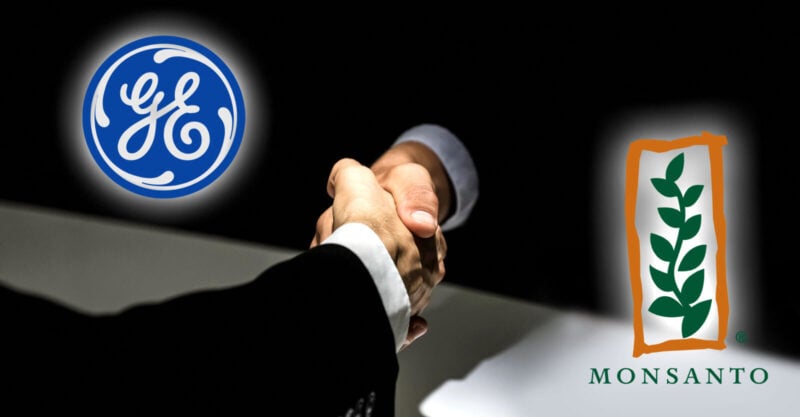Monsanto Cut Secret Deal to Avoid Liability for PCB Contamination, Massachusetts Town Says
Officials in Lee, Massachusetts, shared internal Monsanto documents, including a list tracking cancer diagnoses in employees since 1949. The town accused Monsanto (now owned by Bayer AG) and General Electric Co. of illegally conspiring to avoid accountability for unleashing carcinogenic polychlorinated biphenyls (PCBs) into the town’s environment.
Miss a day, miss a lot. Subscribe to The Defender's Top News of the Day. It's free.
By Dana Drugmand
The former Monsanto company — now owned by Bayer AG — illegally cut a secret deal with General Electric Co. (GE) decades ago to try to shield itself from liability related to polychlorinated biphenyls (PCB) contamination in western Massachusetts, engaging in a conspiracy that continues to wreak harm on the region, according to new complaints from local officials.
In a Jan. 2 letter sent to several local, state and federal officials, including President Joe Biden and U.S. Environmental Protection Agency (EPA) Administrator Michael Regan, officials from the town of Lee said they believe a 1970s-era deal between Monsanto and GE in which GE agreed to release Monsanto from liability for PCB contamination violated the Massachusetts Civil Conspiracy Law.
The town plans to file charges against Monsanto this month, the letter states. Lee officials also accuse the EPA of failing to “adequately investigate” the arrangement between the two companies.
Attached to the letter are internal corporate documents, including a “cancer index” detailing a long list of Monsanto employees diagnosed with cancer dating back to 1949.
The company spreadsheet notes where the employee worked, what type of cancer they suffered and — for many of the workers — dates of death. Monsanto was the sole manufacturer of PCBs in the U.S. from the 1930s through the 1970s.

The move in Massachusetts comes amid mounting community outrage over the construction of a new toxic waste dump in Lee in Berkshire County near a location where GE used PCBs for decades in manufacturing electrical transformers. GE discharged the chemical waste into the nearby Housatonic River.
PCBs have long been linked to an array of human health concerns, including leukemia and other cancers.
In one study of nearly 400 children, researchers found that detection of PCBs in the home was associated with a two-fold increase in risk for acute lymphocytic leukemia.
PCBs are also known to be harmful to fish and wildlife. They do not easily break down, making eradication difficult.
Monsanto manufactured PCBs for use in coolants and lubricators in electrical equipment. Internal corporate records revealed through litigation show the company continued to sell PCBs for years while knowing they posed health risks and publicly downplaying the risks.
One such document cited by Lee officials shows that Monsanto specifically warned some customers about threats from PCBs to animal and marine life and the fact that they did not easily break down in the environment. The U.S. banned PCBs in 1979 but PCB pollution remains pervasive.
And though Monsanto had agreed to stop selling PCBs for most uses by the early 1970s, it continued selling them for some uses under the condition of indemnification with its industrial customers, including GE.
According to a Bayer webpage on PCB litigation, the indemnity agreements involved Monsanto and six former customers that accounted for approximately 93% of PCB sales.
Under the federal Superfund law, the EPA is overseeing GE’s removal of PCB-contaminated sediment from the Housatonic river and allowing GE to deposit over 1 million cubic yards of the lower-concentration toxic material into a lined landfill to be built near the river in the town of Lee.
Legal challenges to the 2020 agreement, which was negotiated behind closed doors, have been unsuccessful.
In their letter, Lee officials cite expert guidance warning the health risks from the landfill could be “catastrophic” to the residents of Lee, and they note that the small community, which has a population of roughly 5,800 people, is generally a low-income area.
Locating the landfill in Lee is an “environmental injustice,” the letter states.
According to Lee officials, the internal documents from Monsanto and GE are relevant to the river cleanup plan because the indemnification agreement between the companies was never disclosed to EPA nor to the First Circuit Court of Appeals, which upheld a dismissal of environmental groups’ lawsuit over the cleanup plan last year.
Tim Gray, a resident of Lee and founder and executive director of the Housatonic River Initiative, one of the groups that challenged the EPA-approved plan, said he is hopeful about the town’s new attempt to hold Monsanto accountable in court.
“I think we have a chance,” Gray said.
Several communities across the U.S. have sued Monsanto over PCB contamination and related health and environmental impacts. Last month, a jury in Washington state found Monsanto liable for $857 million in damages owed to former students sickened by PCB exposure from leaking light fixtures at a school.
In western Massachusetts, a series of lawsuits have been filed against GE and Bayer/Monsanto on behalf of Pittsfield-area residents and families suffering cancers and other diseases they blame on PCB exposure at an elementary school.
The Town of Lee initially filed a lawsuit against Monsanto last spring for knowingly selling a harmful product; the case was dismissed in May 2023 without prejudice, meaning the town could refile.
Bayer issued a statement in response to the Lee letter and allegations, stating, in part:
“This potential case has no merit. Monsanto continues to believe it reflects an unprecedented attempt by the Town of Lee to impose environmental liability on a manufacturer that did not dispose of PCBs in or near the Town and is not a party to a PCB-related settlement under which the Town agreed to create a PCB disposal site.
“After accepting a share of a $55 million settlement payment to host a PCB disposal site, the Town now moves to sue Monsanto, which was not a party to its agreement, attempting to hold the Company liable for the environmental nuisance and trespass created by its own decision to host a Town dump.
“The Monsanto-GE agreement was a routine commercial agreement between two sophisticated companies that were doing business together, and we deny that it was improper in any way.
“The agreement is only between GE and Monsanto, it did not (and could not) release any party from liability to third parties. The agreement had (and has) no impact on any legal liability adjudged by courts or assigned through administrative agencies like the EPA.
“We stand by our statement as Monsanto manufactured bulk industrial PCBs and sold them to sophisticated third party companies, including GE, who used them in the manufacture of building materials like transformers and fluorescent lights which they, in turn, sold to customers.
“Monsanto provided information to its own customers about the risks and benefits of these products — which the Town itself acknowledges.”
Lee Select Board Chair Bob Jones said the company’s narrative is false.
“Quite frankly we’ve got a multibillion corporation walking slipshod over the communities in the Housatonic River corridor,” Jones said.
“We hear every day in the press about the threat of the demise of democracy in America. This is it, case in point, Main Street America, small towns like Lee being forced to have a dump.”
Originally published by The New Lede.
Dana Drugmand is a freelance environmental journalist reporting on climate and energy with a focus on climate accountability.
Sign up for free news and updates from Children’s Health Defense. CHD focuses on legal strategies to defend the health of our children and obtain justice for those injured. We can't do it without your support.





